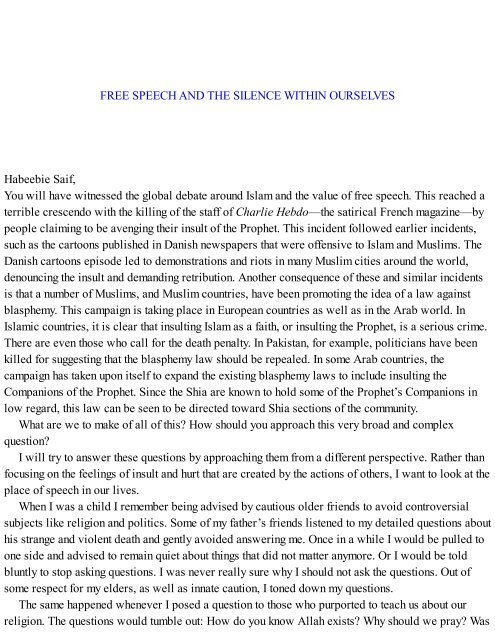1250119847
You also want an ePaper? Increase the reach of your titles
YUMPU automatically turns print PDFs into web optimized ePapers that Google loves.
FREE SPEECH AND THE SILENCE WITHIN OURSELVES<br />
Habeebie Saif,<br />
You will have witnessed the global debate around Islam and the value of free speech. This reached a<br />
terrible crescendo with the killing of the staff of Charlie Hebdo—the satirical French magazine—by<br />
people claiming to be avenging their insult of the Prophet. This incident followed earlier incidents,<br />
such as the cartoons published in Danish newspapers that were offensive to Islam and Muslims. The<br />
Danish cartoons episode led to demonstrations and riots in many Muslim cities around the world,<br />
denouncing the insult and demanding retribution. Another consequence of these and similar incidents<br />
is that a number of Muslims, and Muslim countries, have been promoting the idea of a law against<br />
blasphemy. This campaign is taking place in European countries as well as in the Arab world. In<br />
Islamic countries, it is clear that insulting Islam as a faith, or insulting the Prophet, is a serious crime.<br />
There are even those who call for the death penalty. In Pakistan, for example, politicians have been<br />
killed for suggesting that the blasphemy law should be repealed. In some Arab countries, the<br />
campaign has taken upon itself to expand the existing blasphemy laws to include insulting the<br />
Companions of the Prophet. Since the Shia are known to hold some of the Prophet’s Companions in<br />
low regard, this law can be seen to be directed toward Shia sections of the community.<br />
What are we to make of all of this? How should you approach this very broad and complex<br />
question?<br />
I will try to answer these questions by approaching them from a different perspective. Rather than<br />
focusing on the feelings of insult and hurt that are created by the actions of others, I want to look at the<br />
place of speech in our lives.<br />
When I was a child I remember being advised by cautious older friends to avoid controversial<br />
subjects like religion and politics. Some of my father’s friends listened to my detailed questions about<br />
his strange and violent death and gently avoided answering me. Once in a while I would be pulled to<br />
one side and advised to remain quiet about things that did not matter anymore. Or I would be told<br />
bluntly to stop asking questions. I was never really sure why I should not ask the questions. Out of<br />
some respect for my elders, as well as innate caution, I toned down my questions.<br />
The same happened whenever I posed a question to those who purported to teach us about our<br />
religion. The questions would tumble out: How do you know Allah exists? Why should we pray? Was
















